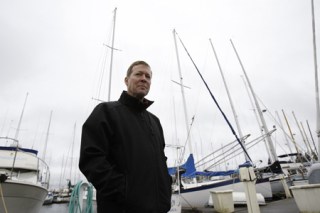Dick Whitson was sitting in the cockpit of his sailboat in Eagle Harbor one day in 1984 when a light in his head suddenly turned on.
He saw that he “lived on a boat with dirty sails. I thought maybe I could make a living by cleaning them.”
When he mentioned his idea to his parents, they told him about a man they knew in Eugene – where Whitson grew up – who cleaned small sails as a sideline. When they contacted the man, he said his work was secret.
A week later, he reconsidered, saying he was ready to retire and would share his knowledge with Whitson.
“I was down there in six hours,” Whitson said. He returned after learning enough to launch his new business.
Despite some initial headwinds, Whitson, now 53, avoided the shoals that often sink many startups. And he’s surviving this season of collapsing financial institutions and dismal Christmas retail sales.
“Business is down a little but it’s still steady,” he said.
One reason for the steadiness is that many boaters are maintaining their existing sails, not buying new ones. And that’s where Whitson comes in.
Whitson began his professional career in the grocery business, but it wasn’t long before he began deviating from the traditional path.
He moved to Tacoma in the early 1980s and had several odd jobs, including working for the Golfing Gorilla, a scratch golfer who provided entertainment for pro tournaments while wearing a simian suit. Tuxedo-clad Whitson was his caddy.
He also ran a singing telegram company, a limousine service and sold fine art.
After moving to Bainbridge, he worked as a tug deckhand and at Fisheries Supply. Not long after becoming an airline flight attendant, he finally had his “aha!” moment.
Whitson couldn’t clean sails in the close confines of the sailboat that served as his home, so he moved off the boat and rented a double-wide trailer.
Because he was financing the project entirely on his own, his work space doubled as his residence.
“It was pretty primitive,” he said. “I cooked on a microwave, used two Tupperware bins to wash dishes. My shower was in a cleaning tub. The waterbed was off in a corner. Every day the interior was soaking wet from the sails. I’d squeegee up as much as I could, then turn on the heat and open the windows.”
Still a flight attendant, Whitson was frequently gone on seven-day trips to the Orient.
“I wanted people to know that I was a going concern,” he said. “Every time the plane landed, I’d run to a pay telephone – there were no cell phones at that time – check my messages, return every call, then run back to the plane.”
When he returned to Bainbridge, he’d pick up the sails as he had arranged over the phone.
“I’d work like crazy for a few days, and drop them off on my way back to the airport,” he said.
When Whitson was transferred to Detroit by his airline, things really got nuts. By now he was making enough money to believe that he could actually make a go of the business. He bade farewell both to the friendly skies and his trailer.
“It made sense to buy property,” he said. “The neighbors were upset with the UPS truck. This way I could live and work and no neighbors could complain.”
Whitson eventually found a property that fit his purposes.
“I was careful to do everything to the letter of the law,” he said. “Out of deference to the neighbors, I located the shop as far from anyone else’s property as I could. And I painted it brown so it would blend into the trees.”
The succeeding years have borne out Whitson’s original optimism. While most of his clientele live in Washington, Oregon and British Columbia, customers come from as far away as Wisconsin.
The cleaning is normally a three-day process.
The first step is to bring the sail inside the shop, spread it out and measure it, which is necessary since Whitson bills on a per-square-foot basis. Then he closely examines it to analyze the different types of stains and determine the cleaners he’ll need.
Over the years, the cleaners he uses have become progressively more “green.” Even at the beginning he had some misgivings about some of his mentor’s chemicals. The fact that the man died of cancer reinforced those misgivings.
“Depending on what I need to get out, I’ll use different vats,” he explained. “I use hand agitation. It’s hard, hard, hard work. Sometimes I’m out there at 10:30 at night.”
When he’s done agitating, the sail remains in the solution overnight.
“The next day I take it out and look at it again, to see if there is some hand work that needs to be done,” he said.
Because many cleaners react to UV light and break down the Dacron (the primary material used to make sails), he puts the sail into a neutralizing rinse to prevent that from happening.
“When that’s done, I hang it and air dry it with fans. The next day I may do a bit more spotting. Then I fold it and either take it to a drop-off point in Seattle or ship it out.”
Looking back on nearly a quarter of a century, Whitson said “It’s a neat niche for me. I work for myself. We’re not wealthy people but it’s a good living.”
**********************
Dick Whitson works by appointment. Reach him at 842-4445.


